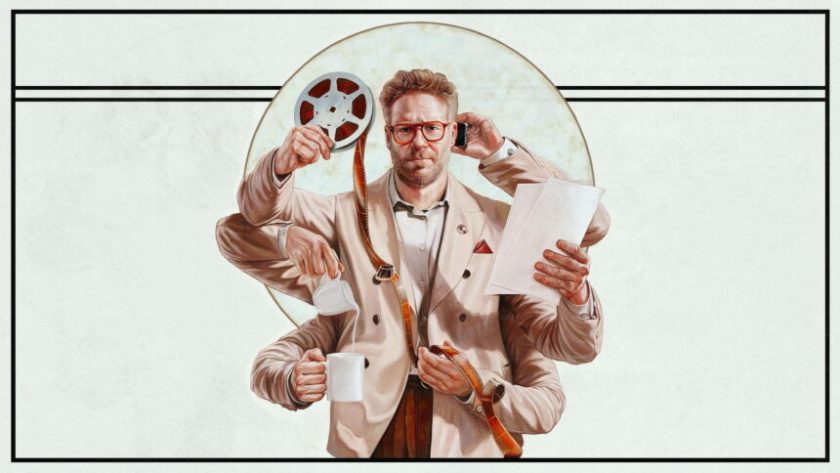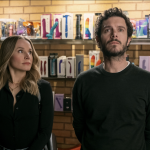Every time Disney green-lights a new live-action sequel of one of its classic films, Tinkerbell takes a drink of poisoned medicine and dies. In an era of Hollywood where the discourse around a film’s success is informed by box-office numbers, it is apparent that the industry’s frontal lobe has become obstructed by a congestion of Benjamins. Talks of the sequel to the remake of the animated adaptation of the One Thousand and One Nights version of the folk-tale of Aladdin (say that five times fast) and the many post-barbie entries into the Mattel Cinematic Universe have left the masses malnourished of originality in media. Thus begins the first episode of The Studio. with a plea for help from Matt Remick, coltishly played by Seth Rogen, who is satirically tasked with taking his dignity to the guillotine by producing a Kool-aid movie. One can only expect Capri-sun to follow suit.
Apple’s newest satire about Hollywood from Hollywood is the existential brain-child of industry insiders Seth Rogen and Evan Goldberg of Superbad fame – a combined love-letter and elegiac eulogy to cinema. From the outset, The Studio makes the distinction between ‘film’ and ‘movies’ clear, setting the stage for the ancient confrontation between art and commerce. It is an implied dichotomy, reliant on subconscious associations: film relates to filmmaker, relates to auteur, relates to artist, relates to art. A movie, by contrast, is simply what it claims to be: a motion picture. Look there at the big explosion on the wall: ooooh, ahhhh! That is not to say that either one would have supremacy over the other; indeed, art does not operate in a hierarchy. However, the context in which the two terms operate in the realm of The Studio, and perhaps the broader Hollywood landscape, presupposes the former to be a purely creative endeavour, linked with high risk and low returns, while the latter is a guaranteed money-maker. “We don’t make films. We make movies!” proclaims the CEO of Continental Studios as he hands over to Remick the mantle of studio head, ostensibly his dream job.
Remick is introduced to the viewer as the executive with a heart of gold – the buffoonish fanboy with sycophantic tendencies in an Armani suit, unable to contend with the disdain of his idols per the corporate soul-selling of his position, despite his apparent earnestness. Realising that the reign he had envisioned as a patron of arthouse cinema is compromised by the studio’s demands to reign in cash from audiences, Remick is left with debilitated resolve. Here, the series highlights and perhaps, draws some sympathy towards, a key Hollywood dilemma: the charge to make original films hindered by the need for inflated budgets that have dominated cinema in the 21st century, budgets sustained in the returns of nostalgia-bait and IP-driven production, deeming them a necessary evil.
It is worth exploring, however, that this idea cannot absolve Hollywood of its corporate greed, there being multiple attributors to the evident decline in media quality, most of them self-inflicted. Common offenders include over-spending, patchy marketing, and overworked/underpaid staff, with some glaring issues within The Studio’s own universe that it fails to address. Does a Martin Scorsese film on Jonestown (though undoubtedly an intriguing idea) really need a $200 million budget? Can arthouse films be blamed for underperforming when their marketing barely penetrates the bubble of devoted cineastes? Is it totally necessary for Marvel to release a deluge of mediocre CGI-messes while its VFX artists suffer through extreme deadline pressures and quantum wages? The Studio does however manage to address the subject of AI, which has come to dominate media discourse in the last half-decade, with brevity and wit, elucidating within a matter of two minutes audience cynicism around the threat of its creeping into film production amongst other artistic spheres.
Despite being produced by Apple TV+, the show manages to briefly wax meta about the hand of streaming platforms in instigating the decline of cinema – though they do slyly seize the opportunity for some self-promotion, with a disillusioned Scorsese proclaiming that he should’ve sold his movie to Apple instead. With the growing danger of Continental’s acquisition by Amazon serving as a frightening reflection of the real-world corporatization of art, The Studio heralds the creation of monopolies within an industry whose very soul is sustained by the distinct visions of independent artists. CEO of Netflix, Ted Sarandos, makes a wry cameo in the urinals of the Golden Globes, speaking of contractually demanding recognition for the success of a film, despite his adversarial enterprises against cinemagoing, most recently in a deeply offensive move to deprive the anticipated cinematic epic that will be Guiellermo del Toro’s Frankenstein of an expansive theatrical release.
Nevertheless, it would seem that Ted and his contemporaries’ efforts would not be in vain, as the rise of the streaming model has driven audience complacency in preferring their flat-screens over IMAX, an observation made in Episode 6,”The Pediatric Oncologist,” where the too-busy doctors claim that they “stream everything now” and “haven’t been to the movies since Covid.” Though with extortionate ticket prices and popcorn buckets that will soon demand amortization, some audience blame can be allayed. But here enters the rub: audiences. The Studio’s accusation that the public would be more engrossed by ‘Kool-aid man doing the Zay Zay shuffle’ over a gritty, Martin Scorsese original is not unfounded in its claim. With the onslaught of short-form, easy-to-consume content on Tiktok, attention spans are on the decline as audiences seek endorphin shots in the shape of nostalgia tokens and scenes that are clear attempts at virality. So while there is an outcry for originality, it is unreflected in audience behavior, case-in-point, the tragedy of allowing the auteur-driven Mickey 17 to flop while the widely-panned Minecraft Movie made nearly a billion worldwide.
In taking on the task of unravelling the inner-workings of Hollywood, it would have been easy for The Studio to cast blames on greedy executives and audience complacency, monologue about the doomed state of the world, roll the credits to a Radiohead song, and release Catherine O’Hara to her under-stated film renaissance. However, Rogen and Goldberg deliver a true insider point-of-view, offering no easy answers but rather, carefully dissecting the compounded conundrum that is the film industry. It leaves no party unscathed, interrogating everyone from studios demanding money, to the filmmaker with a pretentiously singular vision, to the would-be audience member stuck at home, attention split between their TV and their phone. But its intention is not to blame and shame. Its nuanced take makes a point to explore the heart with which each of these parties engage with film, admitting a deep regard and respect for the medium, only to be caught in a vicious cycle of their own inadvertent making. And The Studio is their scream to be cut loose.




